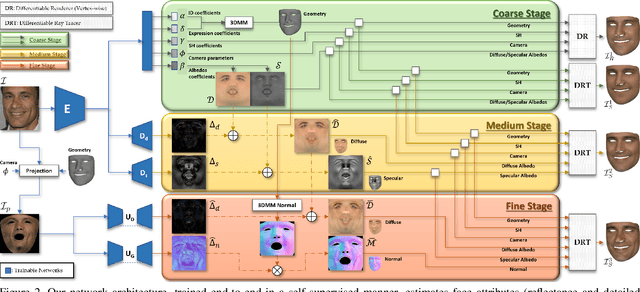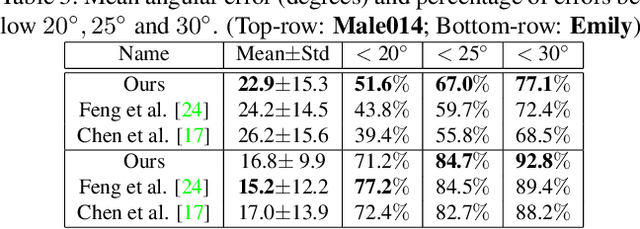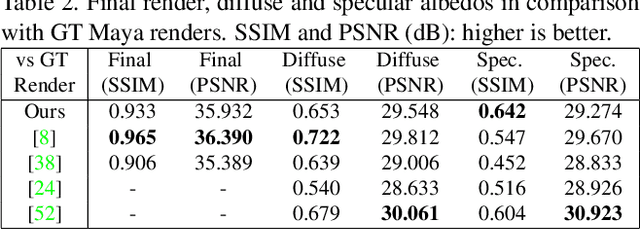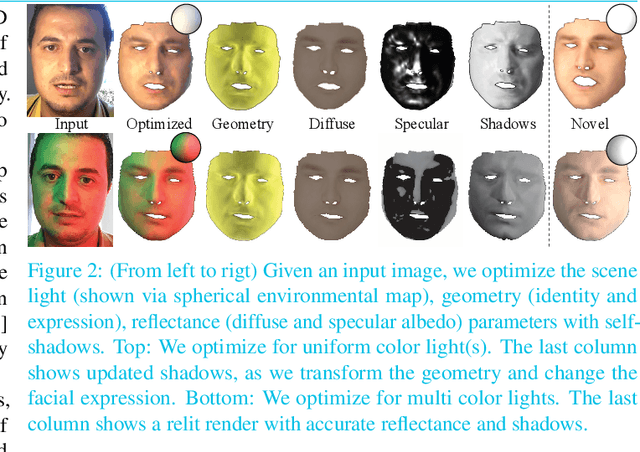Cedric Thebault
S2F2: Self-Supervised High Fidelity Face Reconstruction from Monocular Image
Apr 05, 2022



Abstract:We present a novel face reconstruction method capable of reconstructing detailed face geometry, spatially varying face reflectance from a single monocular image. We build our work upon the recent advances of DNN-based auto-encoders with differentiable ray tracing image formation, trained in self-supervised manner. While providing the advantage of learning-based approaches and real-time reconstruction, the latter methods lacked fidelity. In this work, we achieve, for the first time, high fidelity face reconstruction using self-supervised learning only. Our novel coarse-to-fine deep architecture allows us to solve the challenging problem of decoupling face reflectance from geometry using a single image, at high computational speed. Compared to state-of-the-art methods, our method achieves more visually appealing reconstruction.
Towards High Fidelity Monocular Face Reconstruction with Rich Reflectance using Self-supervised Learning and Ray Tracing
Mar 29, 2021



Abstract:Robust face reconstruction from monocular image in general lighting conditions is challenging. Methods combining deep neural network encoders with differentiable rendering have opened up the path for very fast monocular reconstruction of geometry, lighting and reflectance. They can also be trained in self-supervised manner for increased robustness and better generalization. However, their differentiable rasterization based image formation models, as well as underlying scene parameterization, limit them to Lambertian face reflectance and to poor shape details. More recently, ray tracing was introduced for monocular face reconstruction within a classic optimization-based framework and enables state-of-the art results. However optimization-based approaches are inherently slow and lack robustness. In this paper, we build our work on the aforementioned approaches and propose a new method that greatly improves reconstruction quality and robustness in general scenes. We achieve this by combining a CNN encoder with a differentiable ray tracer, which enables us to base the reconstruction on much more advanced personalized diffuse and specular albedos, a more sophisticated illumination model and a plausible representation of self-shadows. This enables to take a big leap forward in reconstruction quality of shape, appearance and lighting even in scenes with difficult illumination. With consistent face attributes reconstruction, our method leads to practical applications such as relighting and self-shadows removal. Compared to state-of-the-art methods, our results show improved accuracy and validity of the approach.
Face Reflectance and Geometry Modeling via Differentiable Ray Tracing
Oct 03, 2019
Abstract:We present a novel strategy to automatically reconstruct 3D faces from monocular images with explicitly disentangled facial geometry (pose, identity and expression), reflectance (diffuse and specular albedo), and self-shadows. The scene lights are modeled as a virtual light stage with pre-oriented area lights used in conjunction with differentiable Monte-Carlo ray tracing to optimize the scene and face parameters. With correctly disentangled self-shadows and specular reflection parameters, we can not only obtain robust facial geometry reconstruction, but also gain explicit control over these parameters, with several practical applications. We can change facial expressions with accurate resultant self-shadows or relight the scene and obtain accurate specular reflection and several other parameter combinations.
 Add to Chrome
Add to Chrome Add to Firefox
Add to Firefox Add to Edge
Add to Edge